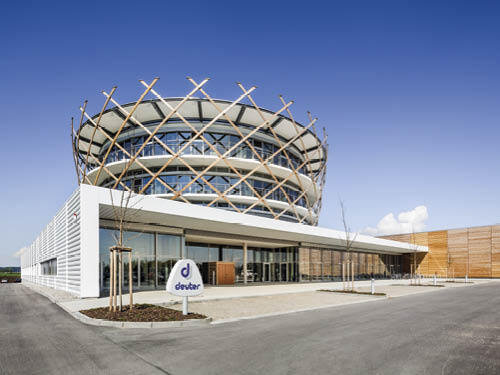We look after the environment
The bluesign® standard
Deuter has been a bluesign® system partner since 2008.
With the optimisation of our manufacturing processes, we rely on the bluesign® standard, the strictest environmental standard for textile productsworldwide.
The bluesign® standard is the world’s strictest standard for:
- environmental protection
- occupational safety and
- consumer protection.
Unlike many organic labels, under the bluesign® standard, the end product is not tested for pollutants or residues of harmful chemicals – instead the manufacturing processes of the individual components of a product are taken into account.
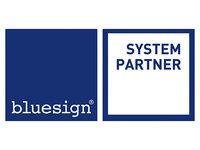
At all stages of the production chain from raw material to finished product, the search is on for ways to optimise material use, energy and water consumption, handling of chemicals, noise, waste, waste water, and occupational safety.
Away from PFC - towards environmentally friendly impregnation
Everywhere you read PFC-free? What exactly does PFC mean?
Perfluorinated and polyfluorinated chemicals, or PFC for short, are substances that are harmful to the environment and have a strong impact on our health. The chemicals are found in many everyday products such as cookware, paper, pizza boxes or textiles such as rain jackets. Once they are released into the environment, they are scattered around the world. Researchers found traces of PFC in drinking water, air, blood, polar bears and breast milk. Some PFCs can even adversely affect reproduction and cause cancer. The harmful fluorocarbons degrade very slowly - over several hundred years - or sometimes not at all.
Why is PFC used at all?
PFCs are used because of their water-, dirt- and fat-repellent properties and, among other things, in breathable membranes. PFCs are a popular means of impregnating textiles, especially in the outdoor sector. Without the water-repellent coating, the material would become soaked with water, wet and thus heavy.
This is how Deuter manages to impregnate in an environmentally friendly way...
For the sake of the environment, Deuter decided several years ago to manufacture all its products without environmentally harmful fluorocarbons (PFCs). Only how? For a long time, there was no comparable alternative to harmful chemicals. Only when Greenpeace launched the campaign "Detoxification of our clothing" in 2012 did suppliers and the chemical industry begin to develop alternative, environmentally friendly methods for impregnating textiles. Many outdoor companies - including Deuter - are responding to this.
All Deuter products will be free of PFC from Spring/Summer 2020!
In order to ensure its water and soil-repellent properties, Deuter now uses a DWR (Durable Water Repellency) that is harmless to health and environmentally compatible and completely dispenses with PFC. This special surface treatment ensures that water beads off the outside of the textiles and the product remains dry. With this method, Deuter is gradually approaching its goal of producing only PFC-free products by 2020.
Responsible Down Standard
To ensure proper maintenance and animal protection in our supply chain, since June 2015 we have only been using certified down and feathers.
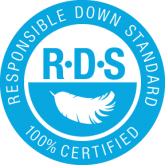
In the production of our sleeping bags, we mainly use synthetic fibres, with only 16% using down. In comparison with synthetic fibres, this natural product still offers the best insulation, especially when taking into account the ratio of low weight to high thermal output.
Live plucking and force feeding mean that down extraction can cause serious harm to the animals. In order to minimise these risks, we have only ever used down that accumulates as a waste product in the Chinese food industry.
Since June 2015, we have taken it a step further and now only buy down certified according to the Responsible Down Standard (RDS). This requires full transparency along the entire production and supply chain, from the chick through the cleaned down to the finished sleeping bag in the sports equipment shop. Transparency is our highest goal. Every individual production location worldwide is visited and evaluated by independent professional investigators. If animal welfare is observed in all phases, the sleeping bag meets the specifications of the RDS certificate (Responsible Down Standard).
Partnership for Sustainable Textiles
Since June 2015, Deuter has been a member of the alliance for sustainable textiles.
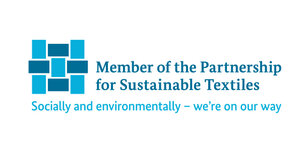
The Partnership for Sustainable Textiles is an initiative of the German federal government and was set up in October 2014. The members from business, civil society, standards organisations and trade unions have made it their goal to make social, ecological and economic improvements along the textile supply chain.
European Outdoor Conservation Association
Deuter is a founding member of the European Outdoor Conservation Association (EOCA)
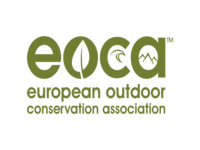
EOCA is a non-profit organisation of the European outdoor industry that supports nature conservation projects throughout the world.
Deuter company headquarters
Deuter’s new construction in Gersthofen near Augsburg, acquired at the end of 2012, meets high environmental standards.
